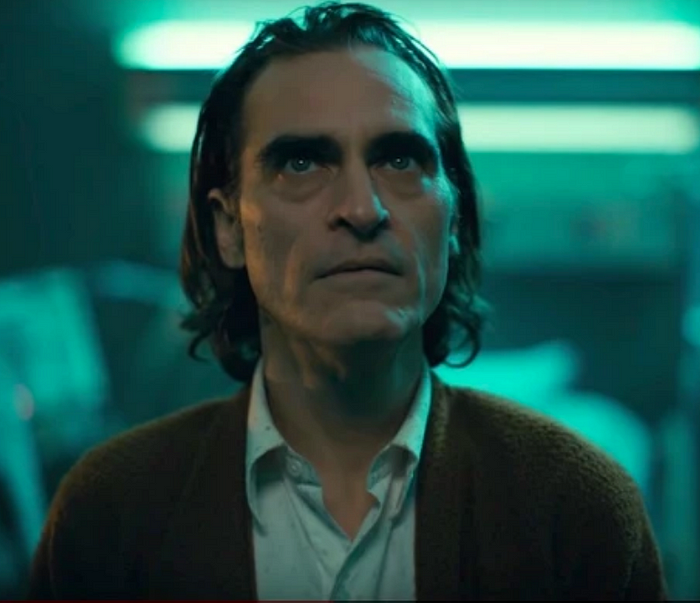Meaning of the ‘Joker’ movie: what you missed
Note: spoilers exist for both “Joker” and “Once Upon A Time In Hollywood”
I’ve read quite a few reviews of Todd Phillips’ Joker movie and none of them talked about what I saw as the most important elements of the movie — the things that made the movie thought-provoking and emotionally affecting.

The first level of basic misunderstanding about Joker: many people seem to think it’s a superhero story or a villain-origin story, when it’s clearly not. To me, the movie is subversive. One could call it an “anti-superhero movie”; it seems to mock our cultural pre-occupation with twisted villains or anti-heroes. It mocks our tendency to find meaning in what are typically superficial character depictions. And much of the movie, including his murder of De Niro’s talk show character, seems to take place only in the character’s delusional mind.
I’ll elaborate on these ideas in the following sections.
There’s no superhero movie action; only tragic acts of violence
The most obvious way it’s not a super-hero movie is that there is no real action in any fun, escapist sense. The “action” is a series of disturbing mentally ill violent acts.
Let’s take the most gruesome one; the killing of his friend/co-worker. For me, this was (surprisingly) one of the most emotional deaths/killings I’ve seen in a fiction movie in quite a long time. The victim was a co-worker of his who obviously cared for Arthur. It was a fairly realistic depiction of the kind of unmotivated, illogical, and disorganized violence some mentally ill people are capable of.
There was nothing justified or fun in this killing. It was just plain sad.
This points to the subversiveness of the movie: many people came to this movie expecting a superhero movie and superhero-movie action. What they got instead was mental illness and tragedy. At some point in the movie, we realize we were (in whatever degree) rooting for a character who is tremendously damaged. That is what I mean when I say the movie is subversive; it subverts our expectations and, in a broader sense, makes us question our excitement about rooting for twisted characters who, in the real world, would necessarily have very bad psychological issues.
Exiting the theater after the show, a kid said he liked how they’d kept the ending open for a sequel. This is a fundamental misunderstanding of the movie. As with many movies, it’s going to be misunderstood by a lot of people, and for better or worse this movie is largely attracting a younger audience and an audience not used to thinking that much about what they assumed would be a fun superhero movie.
This is a standalone movie. It is akin to Taxi Driver. There won’t be sequels. You won’t be seeing future films where Joaquin Phoenix fights Batman. Indeed, in the universe this movie depicts, the concept of Batman may just be some future delusion in Arthur Fleck’s mind (more on that in a bit).
This Joker is not, and will never be, a supervillain mastermind
There are several scenes that reinforce that this is not the origin story of someone who will become a super-villain mastermind. A few elements that emphasize this idea:
• Fleck is disorganized. He makes no grand plans. He can scarcely make any normal plans. The depiction of him walking into the hospital exit-only doors is comical, but it also points to his fundamental disorganized nature. In the gritty, down-to-earth world the movie depicts, and with some basic knowledge of how psychological disorders work, it’s difficult to imagine such a disorganized and troubled person ever becoming any sort of organized mastermind.
• The end of the movie, with him being chased around by mental ward orderlies is slightly comical but, more importantly, it’s pathetic, and a realistic depiction of how a character like Fleck might end up spending his time.
• Near the end of the movie, he dances down the stairwell to the tune of Gary Glitter’s Rock and Roll, Part 2. This scene seems superficially cool/stylish, and is reminiscent of other depictions of the Joker character acting crazy in “cool” ways. In this case, when the police see him, we see him dancing for a moment with no soundtrack, and we are left with a more realistic depiction of him; dancing alone, alone with his insane thoughts. Again, the “coolness” breaks for a moment and we see the situation as it is; as pathetic.
• Even the choice of music in this stairwell-dancing scene seems purposeful and aligns with what I see as the point of the movie. On the surface, the song is a fun, cheesy, superficial stadium rocker. But under the surface, it has hidden associations; Gary Glitter’s pedophilic crimes.
Much of the action takes place in the character’s mind
This I think is the most overlooked part of the movie. The girl he imagines having a relationship with is the most obvious demonstration of this. The less obvious part is that the appearance on the late night show and killing of De Niro’s character is also likely to have just been a schizophrenic hallucination.
The main clue is that so much had happened that made it very unlikely for him to appear on that show:
- He’d entered his neighbor’s apartment (and potentially killed her?); he’d killed his coworker in his (Arthur’s own) apartment.
- He’d told his other coworker that he’d be appearing on the late night show that night.
- The police were investigating him for a huge murder and even with the cops being attacked, it’s unlikely others wouldn’t be hot on his heels.
- The late night show would be unlikely to let someone on that they hadn’t vetted a lot.
- It’s also unlikely, and more akin to a psychotic delusion, that Fleck would have his comedy footage featured on the show or invited on at all.
The fake girlfriend delusion was just a clue to a bigger truth; the talk show stuff was a hallucinatory delusion of grandeur.
The final scene also contains a clue; if Fleck had actually done all of those crimes, it’s unlikely he’d be talking to a counselor in an unprotected setting. He also would be unlikely to be running around free in the facility and playing a comical game of cat-and-mouse with the orderlies. These are things that a person in a low-security mental institution would be experiencing, not a person who had done what he did (at least not for a while after he did it).
The bloody footsteps he takes in the hallway in the final scene are, in this view, in his mind, and would symbolize his unhealthy pre-occupation with death and destruction. It’s a common pattern for schizophrenics to imagine and verbalize that they’ve killed multiple people, even while being non-violent in real life. So this would be in fitting with a realistic depiction of the kinds of delusions some schizophrenics have.
In the world this movie depicts, it’s easy to imagine Fleck having delusions centered around Bruce Wayne becoming his arch-nemesis. The concept of Batman might just be a schizophrenic’s paranoid delusions.
The meaning of the mob
What is the meaning of the city mob that embraces the murderous clown, and eventually Fleck, as a symbol for their movement?
If we keep the subversiveness of the movie in mind, and how it makes us question our expectations and sympathies for insane villains/anti-heroes, I’d argue that the mob represents how we assign deeper meanings, or even completely wrong meanings, to movies and heroes and villains. It could be to mock our infatuation with such things.
For example, you can find article about how the Joker character is actually lauded by anarchists, nihilists, and just the depressed and discontent. This is a quote from this article:
Googling “the joker is right” brings you hundreds of millions of blogs, vlogs, and this infinitely depressing related search term: “childhood is when you idolize batman adulthood is when you realize that the joker makes more sense.”
Another example: you may have read about how Fight Club came to have a lot of meaning for men’s rights activists, incels, and the far rightwing in general, despite the book/movie intending to criticize (however ambiguously) many of these destructive, macho, anti-social ideas.
In the new Joker movie, the mob is angry and looking for meaning, and they latch onto whatever they can find, no matter the fact that the person they’ve randomly latched onto is a mentally ill man whose psychological upheavals only vaguely align with their desire for social upheaval. These illogical assignings-of-meaning are something that happen in our world every day.
U.S. gun-access commentary
Also, the movie depicts what can happen when mentally ill people have easy access to guns. This character’s turn for the worse is kicked off by an acquaintance giving him a gun, and the character then using it.
We’re so used to seeing guns and gun violence in movies, this plot point may easily go unnoticed by most people.
Examining criticism of the movie
Many people have criticized Phillips’ Joker because of the potential for alienated/borderline people associating with the character, and its potential for copycat violence. I think this criticism is misguided for a few reasons.
For one thing, irresponsible movie/TV violence surrounds us. This movie, in my opinion, and unlikely most movies that contain violence, had points to make (as misunderstood or unnoticed as those points may be). It made violence look disturbing and pathetic, and that’s something that most movies, even many dramas and tragedies, struggle to pull off.
Is there a chance some mentally ill people will be affected by this movie? Sure, but you could say that about so many aspects of our culture, and especially our violent movies/shows.
Contrast this with a (fairly arbitrarily picked) movie that, in my opinion, deserves way more scorn and criticism than this movie: Once Upon A Time In Hollywood. The ending of Tarantino’s movie is disturbing in a few ways. For one, it’s a bloody revenge fantasy with zero apparent meaning other than “Hey, wouldn’t it be cool if the bad guys got brutally killed instead?.”
Worse: like many of Tarantino’s movies and many violent movies in general, it makes vicious, over-the-top killing seem cool. (And while we’re talking about it; it lacked logic. Why would DiCaprio’s character know it seemed appropriate to kill the Manson follower with a flamethrower instead of more realistically wondering who she was or what exactly was wrong with her or if a flamethrower might be an over-reaction?)
This is not so much to criticize Tarantino’s movie (even though I thought it was silly garbage) but to point out how strange it is that such depictions of gory “cool” violence can pass under our radar and escape criticism, while a movie like Joker that sparks conversation about many things (our idolization of villains/antiheros, mental illness, influence of gun availability on the mentally ill) creates a whirlwind of anger and criticism.
Isn’t it possible that movies that show zero downside to ultra-violence and that even seem to laud such things have more negative impact on all of our psyches? We are surrounded by such thoughtless depictions.
Obviously the main reason for the extensive and over-the-top criticism is the Batman movie theater shooting several years ago and the shooter’s identification with the Joker character, but that seems a weak and random reason for this level of agitation. It’s easy to imagine such a person identifying with some other insane movie villain, of which there are many to choose from.
